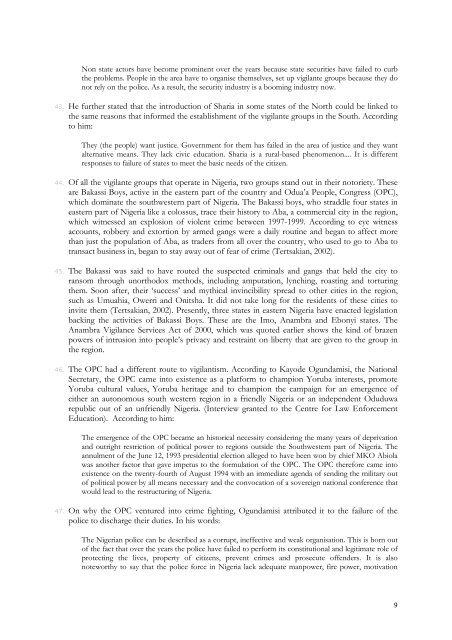114 - Nigeria - Crime and Human Rights Shettima, Kole - The ICHRP
114 - Nigeria - Crime and Human Rights Shettima, Kole - The ICHRP
114 - Nigeria - Crime and Human Rights Shettima, Kole - The ICHRP
You also want an ePaper? Increase the reach of your titles
YUMPU automatically turns print PDFs into web optimized ePapers that Google loves.
Non state actors have become prominent over the years because state securities have failed to curb<br />
the problems. People in the area have to organise themselves, set up vigilante groups because they do<br />
not rely on the police. As a result, the security industry is a booming industry now.<br />
43. He further stated that the introduction of Sharia in some states of the North could be linked to<br />
the same reasons that informed the establishment of the vigilante groups in the South. According<br />
to him:<br />
<strong>The</strong>y (the people) want justice. Government for them has failed in the area of justice <strong>and</strong> they want<br />
alternative means. <strong>The</strong>y lack civic education. Sharia is a rural-based phenomenon.... It is different<br />
responses to failure of states to meet the basic needs of the citizen.<br />
44. Of all the vigilante groups that operate in <strong>Nigeria</strong>, two groups st<strong>and</strong> out in their notoriety. <strong>The</strong>se<br />
are Bakassi Boys, active in the eastern part of the country <strong>and</strong> Odua’a People, Congress (OPC),<br />
which dominate the southwestern part of <strong>Nigeria</strong>. <strong>The</strong> Bakassi boys, who straddle four states in<br />
eastern part of <strong>Nigeria</strong> like a colossus, trace their history to Aba, a commercial city in the region,<br />
which witnessed an explosion of violent crime between 1997-1999. According to eye witness<br />
accounts, robbery <strong>and</strong> extortion by armed gangs were a daily routine <strong>and</strong> began to affect more<br />
than just the population of Aba, as traders from all over the country, who used to go to Aba to<br />
transact business in, began to stay away out of fear of crime (Tertsakian, 2002).<br />
45. <strong>The</strong> Bakassi was said to have routed the suspected criminals <strong>and</strong> gangs that held the city to<br />
ransom through unorthodox methods, including amputation, lynching, roasting <strong>and</strong> torturing<br />
them. Soon after, their ‘success’ <strong>and</strong> mythical invincibility spread to other cities in the region,<br />
such as Umuahia, Owerri <strong>and</strong> Onitsha. It did not take long for the residents of these cities to<br />
invite them (Tertsakian, 2002). Presently, three states in eastern <strong>Nigeria</strong> have enacted legislation<br />
backing the activities of Bakassi Boys. <strong>The</strong>se are the Imo, Anambra <strong>and</strong> Ebonyi states. <strong>The</strong><br />
Anambra Vigilance Services Act of 2000, which was quoted earlier shows the kind of brazen<br />
powers of intrusion into people’s privacy <strong>and</strong> restraint on liberty that are given to the group in<br />
the region.<br />
46. <strong>The</strong> OPC had a different route to vigilantism. According to Kayode Ogundamisi, the National<br />
Secretary, the OPC came into existence as a platform to champion Yoruba interests, promote<br />
Yoruba cultural values, Yoruba heritage <strong>and</strong> to champion the campaign for an emergence of<br />
either an autonomous south western region in a friendly <strong>Nigeria</strong> or an independent Oduduwa<br />
republic out of an unfriendly <strong>Nigeria</strong>. (Interview granted to the Centre for Law Enforcement<br />
Education). According to him:<br />
<strong>The</strong> emergence of the OPC became an historical necessity considering the many years of deprivation<br />
<strong>and</strong> outright restriction of political power to regions outside the Southwestern part of <strong>Nigeria</strong>. <strong>The</strong><br />
annulment of the June 12, 1993 presidential election alleged to have been won by chief MKO Abiola<br />
was another factor that gave impetus to the formulation of the OPC. <strong>The</strong> OPC therefore came into<br />
existence on the twenty-fourth of August 1994 with an immediate agenda of sending the military out<br />
of political power by all means necessary <strong>and</strong> the convocation of a sovereign national conference that<br />
would lead to the restructuring of <strong>Nigeria</strong>.<br />
47. On why the OPC ventured into crime fighting, Ogundamisi attributed it to the failure of the<br />
police to discharge their duties. In his words:<br />
<strong>The</strong> <strong>Nigeria</strong>n police can be described as a corrupt, ineffective <strong>and</strong> weak organisation. This is born out<br />
of the fact that over the years the police have failed to perform its constitutional <strong>and</strong> legitimate role of<br />
protecting the lives, property of citizens, prevent crimes <strong>and</strong> prosecute offenders. It is also<br />
noteworthy to say that the police force in <strong>Nigeria</strong> lack adequate manpower, fire power, motivation<br />
9
















